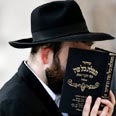
Prequel to a cultural war
Israelis will be asked to determine relation between Judaism and democracy
When historians analyze the turbulent summer of 2005, the “Summer of Disengagement,” they will uncover an intriguing fact: The ultra-Orthodox community, approximately 600,000 strong, stood at the forefront of the anti-disengagement campaign.
Despite the presence of the ultra-Orthodox party (Degel Hatorah) in Sharon’s coalition, ultra-Orthodox public opinion and the community leaders’ fervidly object.
Without a doubt, the ultra-Orthodox community in its entirety has aligned itself with its ideological cousins - the National-Religious pro-settlements crowd - and has come together in an uncompromising, powerful resistance to the process.
What processes are behind this phenomenon? What mysterious force united Rabbi Ovadya Yosef – a dove and a supporter of the Oslo accords, Rabbi Yosef Elyashiv – the leading adjudicator of the ultra-Orthodox community, and Rabbi Mordechai Eliyahu – the settlers’ rabbi?
This astounding harmony is not necessarily an expression of unflinching belief in an undivided Land of Israel. In contrast to stereotypes, the strong opposition of the religious and ultra-religious communities to the pullout is not based on Rabbi Tzvi Yehuda Kook’s messianic texts.
Public opinion surveys conducted in Jerusalem and Bnei Brak indicate a surprising willingness of substantial parts of the ultra-Orthodox community to hand over territories as part of a peace agreement. In a narrower, more focused discussion about Israel’s future borders, the segmentation among the ultra-Orthodox population resembles that of the population at large.
The real forces behind the shift in the ultra-Orthodox community’s attitudes about the disengagement are twofold. The first, relates to the general public debate; the other focuses on the disengagement plan.
The victims’ alliance
The first is not new. Its core lies in the notion that in the estranged, tribal Israel, one is considered a right-winger even without believing that the Land of Israel lies on both banks of the Jordan river.
If you are somewhat observant, belong to a lower socioeconomic layer – you are a right-winger. The categorization of “right” or “left” relies on four factors: Socioeconomics, religion, ethnic background and political affiliation – in this order. On the left are the rich, the Ashkenazi, secular, and politically moderate; on the right, the observant, Sephardic, the poor and politically to the right.
If you belong to three of the four groups of the right, you wouldn’t be able to participate in a pro-peace rally.
The ideological conflict between security experts from right and left over the pros and cons of the disengagement goes over the head of the typical ultra-Orthodox person: He can’t and won’t distinguish between senior Defense Ministery official Amos Gilad’s complex rational and Knesset Member Effi Eitam’s (National Union) ominous vision; both are equally articulate and self assured.
Thus the ultra-Orthodox are instinctively drawn to tribalism; i.e. if Yossi Sarid, clearly anti-religious, represents the yearning for peace – than, I am with the other camp; If I need to choose between Uri Avneri and Bentzi Lieberman as my neighbor -I rather live next to the latter even if we don’t see eye-to-eye politically. Lieberman, at least, does not threaten my faith and way of living.
The absolute identification with the settlers flows from the alliance of the cultural minorities in Israel; the “Alliance of Victims.” In today’s reality, a Jew who feels his faith, his home or his worldview are threatened, finds a niche in the right and, unconsciously, begins to repeat Lieberman’s mantras. Even without knowing if Aztmona is a name of a settlement or a war.
Current processes strengthen the connection between faith and land. Essentially the ultra-Orthodox crowd views the evacuation of Gush Katif as another step in the “disengagement” of the people from the heritage.
Shabat, Talmud and the bible, were abandoned. Jewish education is disregarded. Now the land itself is being deserted, Jews are uprooted from their homes.
Prequel to a cultural war
Beyond the “victims’ alliance,” there is another, more specific, factor that better explains the hawkish attitude adopted by the ultra-Orthodox. It relates to the current social crisis in the National-Religious camp. The ultra-Orthodox are shocked by the Israeli bourgeois’ indifference to the suffering of the settlers;
Basic societal rules must be upheld at all costs: while the world of some is collapsing, others must land their brothers a hand. Instead, sated Tel Aviv is gloating.
This melancholic bewilderment is nurtured when one considers the target; the consensus is that the national-religious sector breeds Israel’s future stars. Israel will not be able to fight the next war without these dedicated youngsters. Who will replace them? None of the MKs and journalists who are willing to forgo the services of the religious Zionist youths offer an alternative.
You might not like the extreme nationalism of these youngsters; you might disagree with the quality and priorities of the national Zionist movement’s values. Nevertheless, nowadays, where is the teenager who will give up a comfortable night’s sleep for an ideal?
The ultra-Orthodox observe how the settlers are treated and wonders what will happen in the day after the Arab-Israeli conflict is no longer on the agenda and a battle over Israel’s Jewish identity ensues? In this scenario, the ultra-Orthodox minority will confront an entire nation.
It seems that the current altercation is but a prequel of things to come in the near future; the face-off between the ultra-Orthodox minority and the government. On that junction, Israelis will be asked to determine what should be the ratio of Judaism vs. democracy; Bnei Brak and Tel Aviv will face one another. Then, in that tragic encounter, the traces of sympathy the government manages to direct at the settlers, will be lost.
Yossi Elituv is deputy editor of ultra-orthodox magazine, "Lamishpacha"










